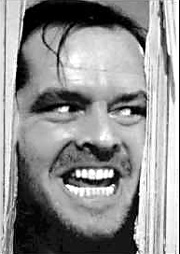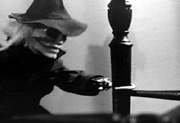Screamin' Sequels
Finding good horror movie challenging
By Alex De Grand
 Halloween is that magical time of the year when an Elvira cardboard standee proffers beer, and the VCR beckons with a bumper crop of horror flicks.
Halloween is that magical time of the year when an Elvira cardboard standee proffers beer, and the VCR beckons with a bumper crop of horror flicks.
Nothing says Happy Halloween quite like "Be Kind Rewind."
But what to rent?
What's the scariest movie of all time? Rosemary's Baby? The Exorcist? The Shining?
And while you puzzle over that one, what's the crappiest horror movie of all time? Maximum Overdrive? End of Days? Any installment of Children of the Corn?
Sometimes the answer can ironically be one and the same, according to Greg Waller, a University of Kentucky English professor who specializes in film.
"One appeal of cult 'bad' movies is that the qualities that make them 'bad' are ones that make 'good' pictures tedious and predictable," Waller said.
"You expect a big budget, mainstream film to be coherent in an unchallenging way," Waller said. "There is a level of expertise and ease to watching it."
"Bad movies break all those rules either due to budget or because the film makers didn't care. Bad movies wrap around to challenge mainstream movies [and become good]."
For example, Night of the Living Dead was a low-budget film that wasn't immediately received as a horror classic, Waller said.
The shoe string blending of horror, violence and overt politics in the movie might not have won audiences over at first, but given time the film's influence could be seen in many subsequent movies, he explained.
When he teaches film, Waller said some students don't know what to make of these cheap, independent American horror films.
Films by the likes of Spike Lee or John Sayles "make sense" and fit into obvious categories, Waller said. In contrast, some see Reanimator "just as bad horror."
While they might be more difficult to classify than other types of independent film, Waller said movies like Fun House and Halloween 3 are "quirky and interesting."
These kinds of horror films are based on expectations that audiences know other movies and are versed in popular culture, Waller said. Scream received a lot of accolades for those kinds of references, but it is hardly the first movie to make them, he said.
Adding more nuance is the fluid nature of horror films.
Maybe your grandparents thought King Kong was scary, but to a lot of kids today, Dunston Checks In probably offers more edge-of-your seat thrills.
"There is no formula [for horror] that transcends time and place," Waller said.
One aspect of horror Waller does view universal to the genre is "that it poses interesting questions."
For example, Waller said Rosemary's Baby considers how we imagine evil and what appears to be threatening.
"It raises questions about gender roles, the state of the family, what the good life looks like," Waller said.
Likewise, Nightmare on Elm Street raises questions about relationships between nightmare and waking life, questioning the idea that there is no spill-over. It also challenges what we assume to be safe parts of our lives.
What makes a movie scary can depend on how an audience connects to the film, Waller said.
"Movies are scary not by what makes me jump, but the ones that stick around in thoughts or comes up in nightmares," Waller said.
For Waller, one of those films was Don't Look Now (1973) in which a young British couple become mixed up in bizarre occurrences following the death of their daughter that may or may not have been accidental.
Waller said he could strongly identify with the husband who tries to rationally comprehend the strange phenomena. Like that character, Waller said he tries to confront the world with an intellectual's cool demeanor.
Clearly, Waller takes on horror movies that way.
But in case you're looking for a source less on the Proust and heavier on the Corman, look no further than the web site, "Horror Movies That Suck" at www.Jason.Hardy.com.
www.Jason.Hardy.com.
The site contains straight-talking reviews of about 170 horror films, including the recent (Hollow Man, Scream 3), the "classics" (Christine, The Birds) and the obscure (Christmas Evil, Retro Puppet Master).
Of American Psycho (a film highly recommended by the site), the review states "I've never seen anyone get slayed while Huey Lewis played in the background before. Gotta love that!"
A withering review of Children Shouldn't Play with Dead Things proclaims the ending as "pretty dumb" and offers this insight:
"After the zombies kill everyone they steal the boat the others used to get to the island and head for the city. Well since this movie was from 1972 and there still hasn't been a sequel I guess it's safe to say the zombies hit an ocean storm on their boat ride and landed on Gilligan's Island. Ever wonder what happened to Skipper and Gilligan??? Now you know."
HOME | THIS ISSUE | ACE ARCHIVES